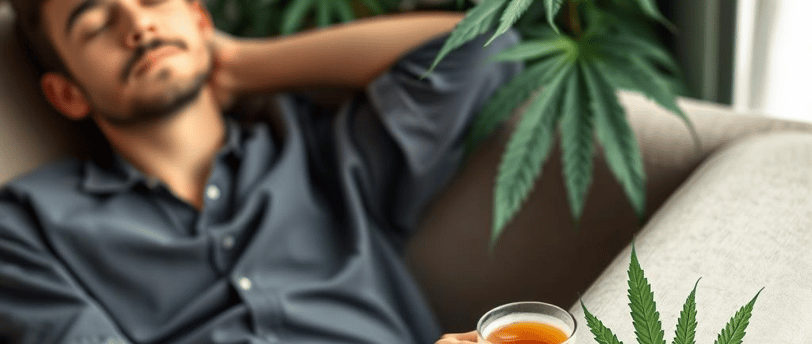Cannabis for Stress & Anxiety: A Natural Way to Unwind and Relax
🧘STRESS AND ANXIETY


In today's fast-paced world, stress and anxiety have become all too common. Many individuals are seeking natural alternatives to traditional pharmaceuticals to manage these conditions. Cannabis, with its diverse chemical compounds, has emerged as a potential contender. This article explores the use of cannabis for stress and anxiety, examining its potential benefits, risks, and providing a comprehensive overview of its application.
Understanding Stress and Anxiety:
Stress is a natural response to demanding situations, while anxiety is a persistent feeling of worry or unease. Chronic stress and anxiety can significantly impact mental and physical health, leading to sleep disturbances, digestive issues, weakened immune systems, and increased risk of cardiovascular diseases.
Cannabis: A Potential Remedy?
Cannabis contains hundreds of chemical compounds, the most well-known being delta-9-tetrahydrocannabinol (THC) and cannabidiol (CBD). THC is psychoactive and responsible for the "high" associated with cannabis use, while CBD is non-psychoactive and is often touted for its therapeutic potential.
Scientific Evidence:
While research is still ongoing, some studies suggest that cannabis, particularly CBD, may possess anxiolytic (anxiety-reducing) properties.
CBD and Anxiety: Several preclinical and clinical studies suggest that CBD can reduce anxiety in various conditions, including social anxiety disorder, generalized anxiety disorder, and panic disorder. A 2015 review published in Neurotherapeutics concluded that CBD has considerable potential as a treatment for multiple anxiety disorders (Blessing et al., 2015). Furthermore, research published in The Permanente Journal (Shannon et al., 2019) indicated that CBD may improve sleep and/or anxiety scores.
THC and Anxiety: The effect of THC on anxiety is more complex. Low doses of THC might reduce anxiety in some individuals, but higher doses can paradoxically increase anxiety and even trigger panic attacks. Individual sensitivity to THC varies greatly.
Common Symptoms Cannabis May Help Alleviate:
Users have reported that Cannabis use has helped them find relief from some of the common symptoms of stress and anxiety, including:
Restlessness: Specific cannabis strains can help calm the mind and body.
Difficulty Concentrating: Certain cannabinoids may help improve focus and concentration.
Irritability: Cannabis can help regulate mood and reduce feelings of irritability.
Sleep Disturbances: Cannabis may promote relaxation and improve sleep quality.
Causes Cannabis May Help Address: Cannabis can help with the following causes;
Chronic Pain: Cannabis can alleviate pain, reducing stress related from it.
Social situations: Cannabis can have a positive impact on social interactions.
Reduce stress levels Some cannabis strains will reduce the stress level of the body.
Forms Available:
Cannabis comes in various forms, each with its own onset time and duration of effects:
Flower (for smoking or vaping): Provides rapid onset and relatively short duration.
Oils and Tinctures: Administered sublingually (under the tongue) for relatively quick absorption.
Edibles (gummies, chocolates, etc.): Have a delayed onset (30-90 minutes) and longer duration of effects.
Topicals (creams, lotions): Applied to the skin for localized relief; does not typically produce psychoactive effects.
Capsules: Provide a pre-measured dose for consistent effects.
Dosage:
Dosage is highly individual and depends on factors such as body weight, metabolism, the specific cannabis product, and the individual's sensitivity. It's crucial to start with a low dose and gradually increase it until the desired effects are achieved. Consulting with a healthcare professional experienced in cannabis therapy is highly recommended to determine the optimal dosage.
Recipes:
While smoking or vaping are common methods of consumption, incorporating cannabis into edibles provides another avenue. Important Note: Dosage control is critical when making edibles.
Cannabis-Infused Coconut Oil: Can be used in various recipes, from baked goods to stir-fries. Decarboxylate cannabis flower (heat at 250°F for 30-45 minutes) to activate the cannabinoids. Infuse into melted coconut oil using a slow cooker or double boiler. Strain and store in an airtight container.
Cannabis Tea: Steep decarboxylated cannabis flower in hot water with a fat source (like coconut oil or milk) to aid cannabinoid absorption.
Side Effects and Precautions:
While generally considered safe, especially CBD, cannabis can have side effects:
THC-related: Anxiety, paranoia, impaired cognitive function, dry mouth, red eyes, increased appetite.
CBD-related: Drowsiness, diarrhea, changes in appetite.
Drug Interactions: Cannabis can interact with certain medications. Consult your doctor if you are taking other medications.
Mental Health: May worsen symptoms in individuals with pre-existing mental health conditions like schizophrenia.
Pregnancy and Breastfeeding: Cannabis use is not recommended during pregnancy or breastfeeding.
Driving or Operating Machinery: Cannabis can impair judgment and coordination. Do not drive or operate heavy machinery while under the influence.
Precautions:
Start Low, Go Slow: Begin with a low dose and gradually increase until the desired effects are achieved.
Source Matters: Purchase cannabis products from reputable sources to ensure quality and safety.
Consult a Healthcare Professional: Especially if you have underlying health conditions or are taking medications.
Be Aware of Legal Regulations: Cannabis legality varies widely depending on location.
Conclusion:
Cannabis holds promise as a potential natural remedy for stress and anxiety. CBD, in particular, has shown anxiolytic properties in some studies. However, individual responses can vary, and it's crucial to use cannabis responsibly and under the guidance of a healthcare professional. Further research is needed to fully understand the long-term effects and optimal usage of cannabis for anxiety and stress management.
References:
Blessing, E. M., Steenkamp, M. M., Manzanares, J., & Marmar, C. R. (2015). Cannabidiol as a Potential Treatment for Anxiety Disorders. Neurotherapeutics, 12(4), 825–836.
Shannon, S., Lewis, N., Lee, H., & Hughes, S. (2019). Cannabidiol in Anxiety and Sleep: A Large Case Series. The Permanente Journal, 23, 18–041.
Numerous other scientific articles are available on PubMed and Google Scholar. Search for terms like "CBD and anxiety," "Cannabis and stress," and "THC and anxiety" for more information.
Disclaimer: This article is for informational purposes only and does not constitute medical advice. Always consult with a qualified healthcare professional before using cannabis for any health condition. The information provided is not intended to diagnose, treat, cure, or prevent any disease.
